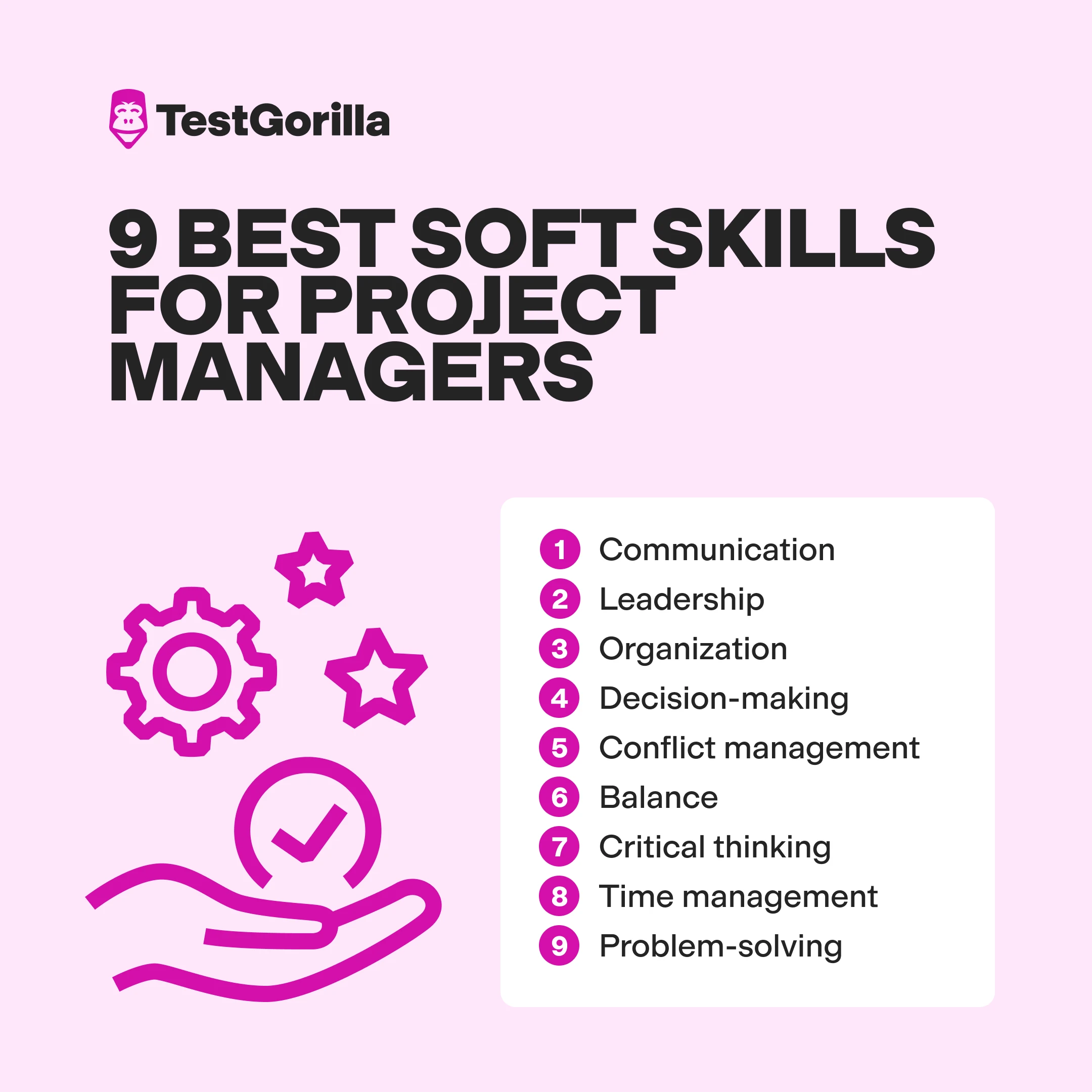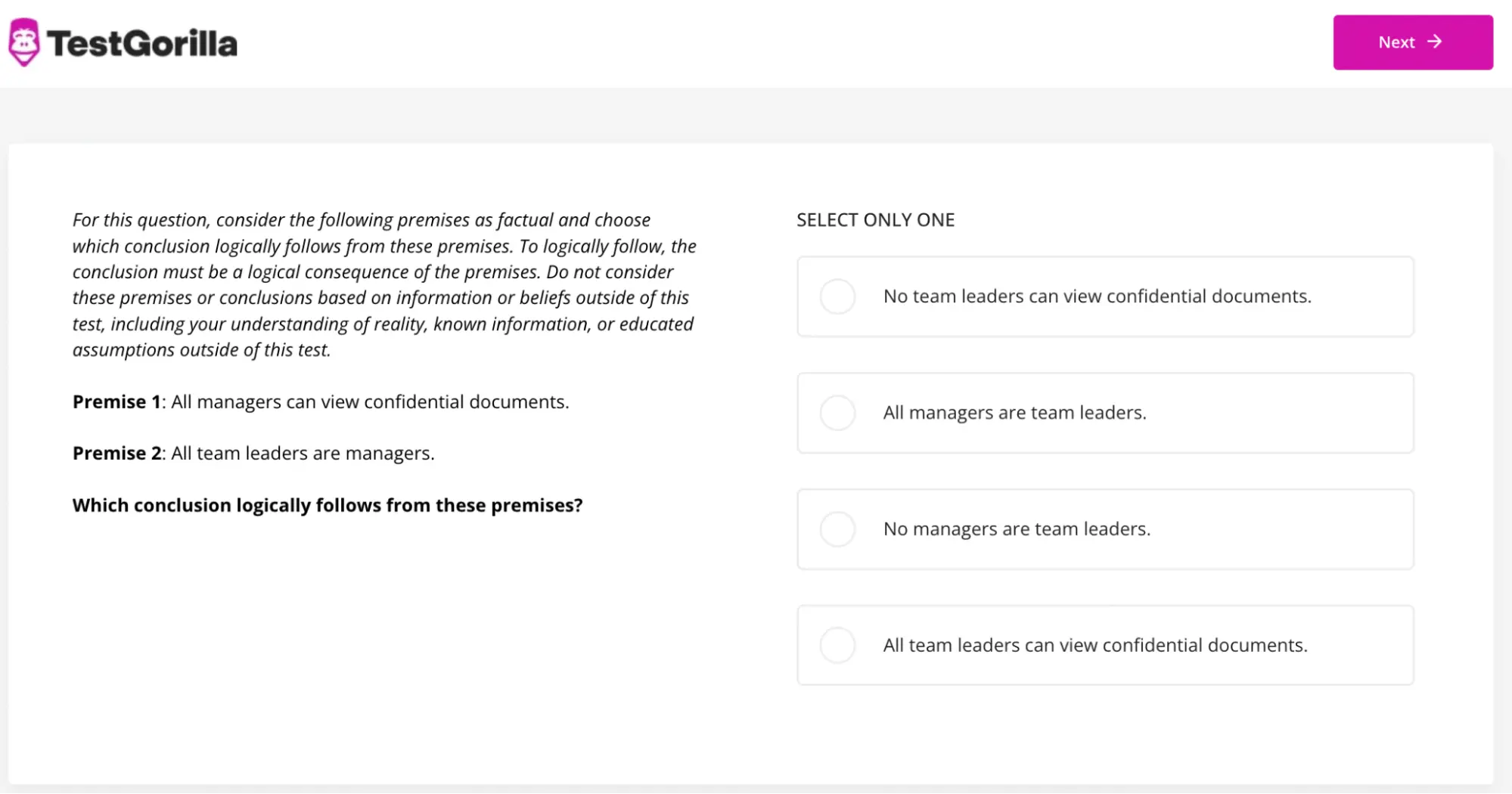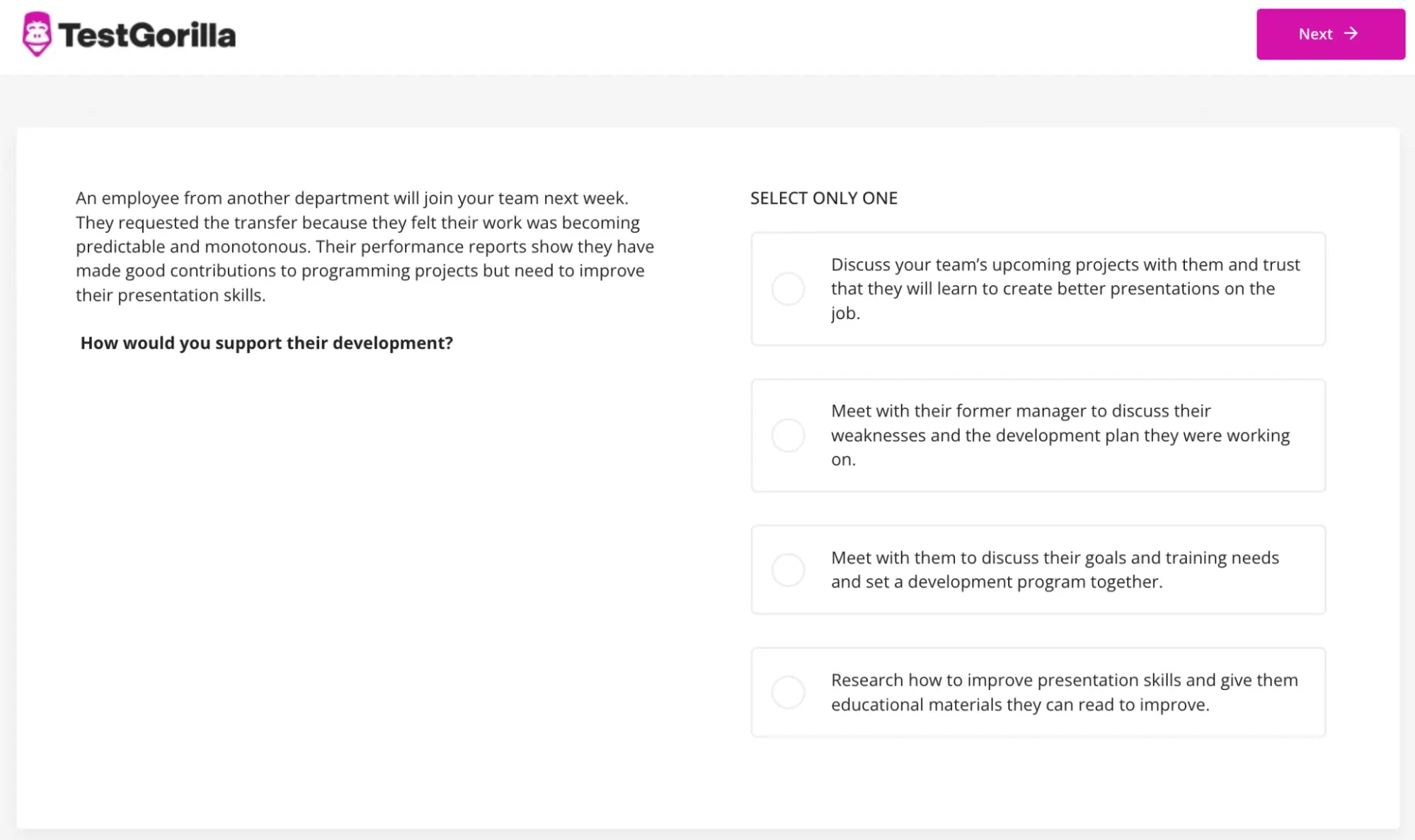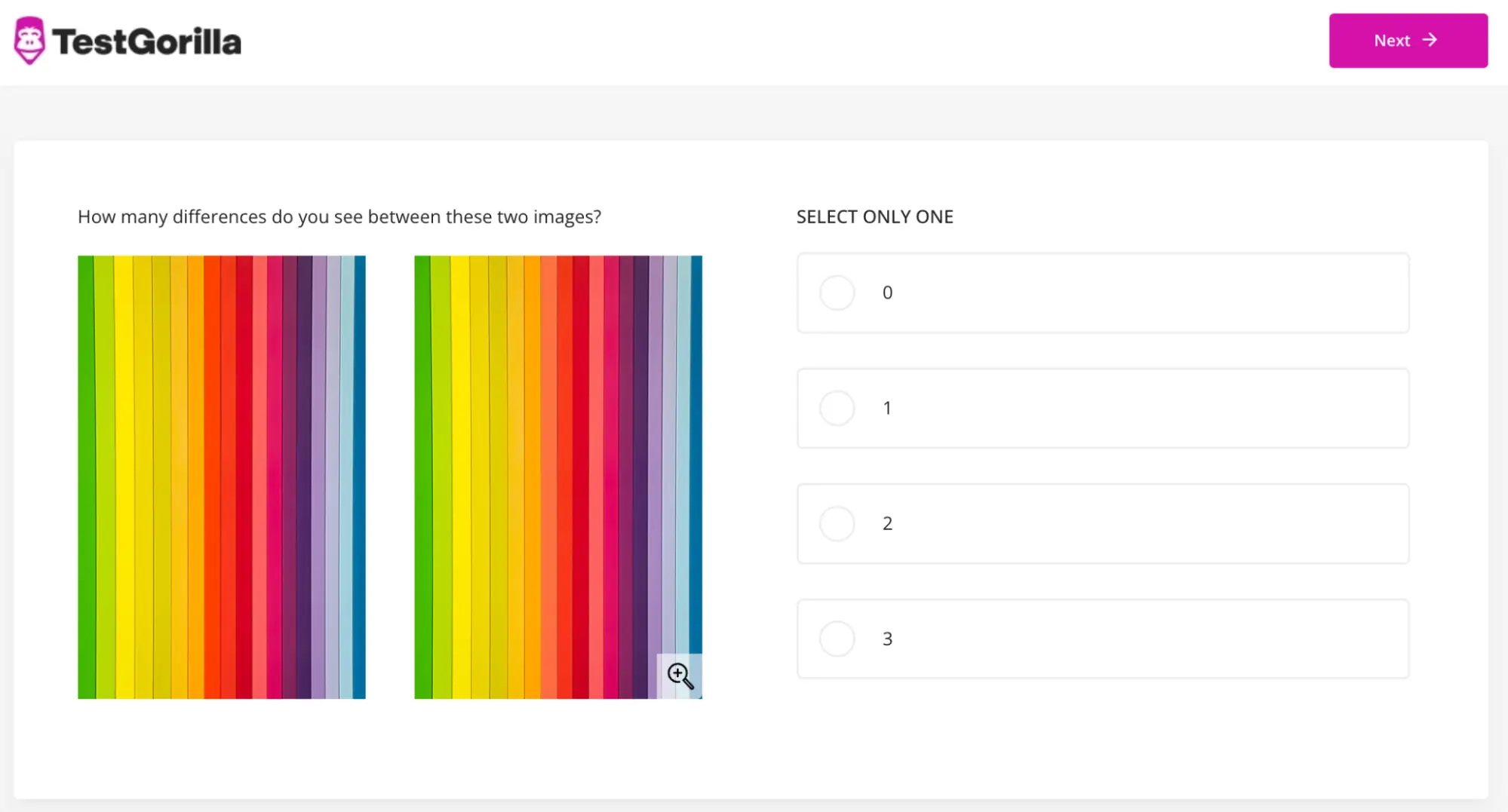Start testing recruits for project management soft skills
Project managers (PMs) are some of the most approachable and innovative people you can hope to work with.
Sure, a good PM needs to know how to use certain software, but it’s not all about technical ability – there are many essential soft skills for the role. Project management soft skills help them be more understanding, motivated, and collaborative with others to reach shared goals.
Without soft skills in project management, business owners risk missing deadlines, demotivating employees, and disappointing clients.
Let’s explore the most important soft skills for project managers, how recruiters measure them with talent assessments, and how to develop them.
Table of contents
9 best soft skills for project managers
Assessing technical project manager skills is important, but don’t ignore the power of soft skills – that is, interpersonal skills that help an employee build trust and excel in social environments.
After all, up to 61% of business owners believe PMs need these skills to succeed.
Project manager soft skills help people become more effective, inspiring leaders. Below, we’ve gathered nine of the best.
Project management power skills: In summary
Before we dive into the details, here’s a quick breakdown of the best soft skills for project manager roles.
Power skills in project management | In brief |
1. Communication | Actively listening to others to understand project needs and sharing updates with different audiences |
2. Leadership | Helping people visualize goals, build up strengths, and work on weaknesses |
3. Organization | Setting clear goals, arranging budgets and timetables, and holding others to account |
4. Decision-making | Prioritizing critical tasks and making informed, confident choices under pressure |
5. Conflict management | Patiently listening to and supporting employees’ needs, making fact-based decisions |
6. Balance | Caring for one’s mental and physical health to avoid stress and burnout, empathizing with others |
7. Critical thinking | Making data-based decisions at short notice without bias or emotion |
8. Time management | Arranging project deadlines, setting employee schedules, and following up at project checkpoints |
9. Problem-solving | Looking beyond usual practices to brainstorm and break down issues, collaborating with others, and looking closely at facts |
Learn how to use TestGorilla to measure project management skills
One of our friendly experts is on hand to demonstrate the benefits of using talent assessments to hire skilled project managers.
1. Communication
Project managers communicate daily with team members, clients, and other stakeholders to make sure everything is on target and everyone understands what’s happening.
The best project managers are active listeners. They work to an 80/20 model, meaning they speak only 20% of the time, ask insightful questions, and repeat information to make sure they understand what was said.
Effective communication is a top project manager quality because PMs need to express themselves clearly and concisely to avoid misunderstandings.
Project managers need to adapt their communication styles based on the group of people they’re speaking to. For example, they may consider the differences in communication styles between technically-minded engineers and big-picture-seeing shareholders.
PMs can develop good communication skills by:
Ensuring they understand their projects and what’s needed
Practicing listening before speaking
Reading instructions aloud
Creating different templates for writing to different audiences
Paying attention to body language
2. Leadership
Leadership skills are important for guiding any project team to success, and the best project managers motivate team members, manage conflicts, and maintain morale.
Project managers with these skills help people visualize goals and look at the bigger picture, clearly defining where everyone fits in.
The best PMs don’t just prioritize people’s strengths. They gently yet firmly encourage people to improve areas of weakness.
For instance, a great leader encourages better timekeeping, sets clear boundaries, and offers training rather than aggressively barking orders. They’re leaders, not micromanagers.
PMs can develop leadership skills by:
Getting to know their team members
Asking for feedback and committing to growth
Communicating openly and honestly
Understanding project needs and organizing clear checkpoints
Working on motivation, negotiation, and relationship-building skills
3. Organization
All good project managers are self-starters with exquisite organizational skills. They oversee all working parts of their projects, managing people, deadlines, resources, and budgets.
An effective project manager is organized enough to be comfortable handling many moving parts at once. They’re proactive at setting goals, establishing timescales, and delegating tasks.
At the same time, they ensure the people they work with are held accountable for their assignments.
PMs can develop organization skills by:
Writing checklists and using project management software
Creating simple overviews of project goals before work begins
Communicating openly with everyone involved in the project, e.g., through Slack channels
Keeping filing systems tidy and easy to understand
Challenging procrastination and being more proactive with tasks
Track milestones, timelines, and the general workflow of the project
4. Decision making
Project managers need to deal with decisions that vary in complexity and urgency.
For instance, they need to carefully balance:
Routine decisions they can make with little input
Complex decisions that need specialist insight
Critical decisions that need immediate action
A PM with good decision-making skills confidently uses different resources and project management tools to ensure they have all the necessary facts. Decision-making often involves:
Gathering data from various sources
Analyzing the data to make sure it’s accurate
Using teamwork to brainstorm solutions
Considering insight from the team before making a final decision
Using risk management to weigh the options
5. Conflict management
Unfortunately, long-term projects often involve conflicts of opinion and personality. Take, for example, a marketing team working on visual rebranding for a new client.
That team likely has many visual experts with different tastes, opinions, and creative methodologies. What if they clash over the best tools to use, or if there’s competition over which draft designs are most appealing?
They need a PM who can calmly and objectively manage these conflicts. In fact, managers spend more than four hours every week handling disputes between employees.
A great project manager is patient, empathetic, and objective. They listen carefully to all sides of a conflict and make decisions based on the facts.
Project managers with conflict management skills help people put aside their differences and look at the bigger picture without taking sides.
PMs can develop conflict management skills by:
Actively listening to the people they work with
Looking at problems without emotion or bias
Searching for the root causes of issues
Avoiding personal biases
Learning about body language and nonverbal cues
6. Balance
Project management carries a lot of responsibility, which can lead to stress, anxiety, and exhaustion.
Balancing personal and professional life effectively, however, helps project managers avoid burnout.
Yet, many people aren’t balancing their lives properly. Although 94% of people believe work-life balance is important, only 78% believe they have it.
The best project managers understand they need to rest, recharge, and care for themselves outside of work to perform at their best and, in turn, deliver project success. PMs who practice self-care are more likely to be empathetic with their employees, too.
A well-rested PM is optimistic, confident, and proactive, which are all great leadership qualities.
PMs can develop balance skills by:
Taking regular breaks
Arranging personal time and vacation days when needed
Getting enough sleep
Eating healthily and exercising regularly
Scheduling self-care and work activities
7. Critical thinking
Critical thinking helps project managers make difficult decisions in the heat of the moment.
Imagine you have a lot of conflicting data, no one to collaborate with, and a fast-approaching deadline. You need to look at the facts objectively across every part of the project and make a confident choice you can justify.
Critical thinking is a core part of good decision-making. A PM who thinks critically is agile, finds it easy to spot barriers and flaws, and doesn’t let stress or emotion cloud their judgment.
This skill is important when juggling tight deadlines, depleting budgets, and limited help.
PMs can develop critical thinking skills by:
Visualizing how other people might solve problems
Breaking down problems into logical steps
Using Occam’s Razor, i.e., what’s the simplest and most likely outcome?
Keeping a logbook of decisions they make and spotting emotional patterns
Practicing better habits, e.g., avoiding overthinking
8. Time management
Deliverables revolve around deadlines, meaning a good project manager easily arranges schedules, follows up on checkpoints, and ensures everyone has enough time to do their part.
PMs with time management skills help others to use their own time wisely. Through careful task management, they measure how long specific tasks are likely to take and set realistic deadlines for their team members.
PMs can develop time management skills by:
Experimenting with deadlines on non-critical tasks
Practicing planning and making lists
Starting as early as possible on tasks
Learning how and when to delegate
Breaking down large tasks into smaller amounts
9. Problem solving
Most project managers face common problems such as delays or conflicting schedules.
When these issues arise, a good project manager uses problem-solving skills to:
Assess challenges
Brainstorm possible answers
Consider the risks involved
Make an informed decision
Project managers with problem-solving skills make great analysts and researchers. They think laterally and creatively and aren’t afraid to go beyond the beaten path to get results.
PMs can develop problem-solving skills by:
Using data to arrange potential risks in each project
Focusing on the root causes of common issues
Learning from mistakes
Striving to be more proactive and positive at work
Asking for feedback and help from others
How to assess project manager soft skills and traits: 5 assessments
Okay, take a quick breath. That’s a lot to take in!
Now, the best way to hire a trustworthy project manager is to test their skills.
Otherwise, you’re relying on lengthy resumes where around a third of people lie about their experience.
Tests for project management power skills: A summary
Below, we explore some of TestGorilla’s best options to assess soft skills for project managers.
In addition to the five tests below, we suggest you check out our all-in-one Project Management test, which grades applicants based on all the essential project manager soft skills listed above.
From there, read up on 50 project manager behavioral interview questions you can ask to narrow down the talent field.
Let’s get back to the skills with a quick summary.
Assessment | In brief |
1. Critical Thinking | Assesses people’s ability to recognize factual statements, interpret complex data, and make confident decisions under pressure |
2. Communication | Judges how effectively people share information and collaborate with others |
3. Leadership & People Management | Grades ability to motivate and unite people, delegate tasks effectively, and support performance |
4. Time Management | Assesses ability to organize tasks, prioritize workloads, communicate deadlines, reduce distractions, and hold people to account |
5. Attention to Detail (Visual) | Judges ability to spot patterns, flaws, and opportunities in projects while measuring focus and attention span |
1. Critical Thinking
TestGorilla’s Critical Thinking test assesses a candidate’s ability to think creatively, analyze problems, and resolve difficult situations.
With this test, you can check your candidates’:
Inference: The ability to tell if a statement is true, false, or impossible based on the data given:
Assumption recognition: The ability to identify false assumptions and recognize valid assumptions
Deduction: The ability to draw logical conclusions from information and spot evidence supporting a specific argument
Interpretation: The ability to interpret data, such as statistics, and identify how it relates to a discussion
The Critical Thinking test helps you find a project manager who is:
Open-minded
A good decision-maker
A good problem-solver
An effective communicator
2. Communication
TestGorilla’s Communication test assesses how well someone conveys messages to others. Questions in this test usually include written exercises, oral interviews, and role-plays.
You can check your candidates’:
Verbal communication: The ability to explain complex concepts in simple terms
Listening skills: The capacity to ask questions and understand others’ points of view
Written communication: A measure of how someone understands written communication, such as emails and reports
This talent assessment helps you find project managers who:
Work well with others
Communicate effectively with different audiences
Confidently resolve conflicts
Why not look at some more sample questions from this test for free?
3. Leadership & People Management
Our Leadership & People Management test measures a PM’s people skills such as taking charge of a situation, motivating others, building relationships, and handling conflict. It checks for the following skills:
Delegation of authority and tasks
Giving timely feedback and guidance to teams and clients
Supporting the growth of others
Mediation
Creativity
Questions in this test focus on self-awareness and emotional intelligence. It typically consists of multiple-choice questions and exercises that assess the ability to lead, motivate, and manage teams:
It measures a candidate’s potential to handle complex tasks and take on additional responsibilities when needed.
With this test, you can find a project manager who:
Understands how to prioritize the goals and needs of your organization
Helps others develop and grow their careers
Unites a team to meet important business objectives
Leads by example
Helps people to ask questions and share ideas
4. Time Management
The Time Management test measures a candidate’s ability to plan, prioritize tasks, and make quick decisions. It typically consists of multiple-choice questions, scenarios, and timed simulations.
This test checks:
Prioritization: The ability to sort the important from the urgent
Project planning: The ability to organize work efficiently
Reflection and communication: The ability to think about work, monitor progress and outcomes, and communicate this information with relevant parties
Execution: The test uses real-life scenarios to assess a candidate's decision-making
With this test, you can hire someone capable of:
Delegating tasks appropriately
Creating detailed plans
Limiting distractions
Meeting deadlines
Ensuring tasks are completed efficiently
If you’d like to see this test tailored to your own hiring needs, book a free 30-minute demo with us for the full lowdown.
5. Attention to Detail (Visual)
The Attention To Detail (Visual) test examines someone’s ability to observe and remember details. It helps recruiters measure a candidate’s attention span and ability to concentrate on tasks.
Judging attention to detail helps recruiters find project managers who can confidently minimize errors, supervise tasks more effectively, and complete projects on time.
This test typically consists of images with slight differences between them:
The candidate needs to identify these tiny details in a given amount of time, measuring short-term memory, attention span, and ability to recognize patterns quickly.
That means it’s easy to judge if your prospective PM is a critical thinker who organizes themself and others well and who has high standards of accuracy for project outcomes.
This test helps you find an individual who can:
Manage complex projects
Identify discrepancies in data sets
Interpret reports accurately
We recommend using our builder software to set up multiple soft skills tests in a single assessment. Doing so helped companies like TreviPay scale up by running various tests with several candidates at once. Why not follow their lead?
Unlock the power of talent assessments with TestGorilla
Getting started with TestGorilla is easy and 100% free. All you need to do is sign up and start planning your project managers’ next assessment.
The best insights on HR and recruitment, delivered to your inbox.
Biweekly updates. No spam. Unsubscribe any time.
How to develop power skills in project management
Now that you know about the importance of soft skill sets in project management, let’s recap a few quick ways to develop these skills.
Practice active listening: Spend less time waiting to speak and more time listening critically to what people have to say
Encourage collaboration: HR managers can help people develop leadership and problem-solving skills by setting up group training and team-building activities
Focus on feedback: As an individual, ask for feedback and input from your colleagues on your project management skills; as an HR manager, build a culture of open feedback with anonymous sharing
Build plans and checklists: Become more organized by breaking down your workloads into smaller amounts with clear checkpoints
Truncate your timescales: Experiment with time management – remember that a task often takes as long as the time allotted, and try setting shorter timescales
Learn about body language: Little communication is verbal, so learn more about what body language means and become more empathetic and insightful
Taking time off: As an individual, welcome balance with regular breaks and time off to refresh – and, as an HR manager, be creative with PTO options and self-booking systems to prioritize individual self-care
As an HR professional, remember to test for technical or complex project management skills, too – and start training well-rounded managers.
Another opportunity for project managers to develop their skills is by taking online courses through the Project Management Institute (PMI), where they can earn a Project Management Professional (PMP) certification.
Test for project management soft skills and hire a proactive, innovative leader
Would you seriously hire a technically brilliant project manager who struggles to motivate and collaborate with others? Probably not.
That’s why testing for project manager soft skills should be at the top of your hiring and interviewing agenda.
Successful project management is more than opening a spreadsheet and barking orders at people. It’s a lot of interpersonal work, and although technical skills are involved, project management soft skills are just as important.
It’s quick and easy to start exploring skill tests with TestGorilla’s Free Forever Plan.
Need a tour of the best features before you get started? Head on over to our product tour and take a good look around.
From there, if you’d like us to show you our customized skills testing engine in action, just ask – book a free 30-minute demo with zero commitment.
The importance of soft skills in project management: FAQs
Let’s close our guide to the best soft skills for project manager positions with some commonly asked questions.
Why are project management soft skills important?
Soft skills enable project managers to interact and engage effectively with other people. Project managers with good soft skills are more likely to manage people and tasks effectively, improving the chances of successful project completion.
Project managers with soft skills are better equipped to handle conflict, make informed decisions, and find creative ways to solve problems.
What are the top 3 characteristics of a project manager?
Flexibility: The best project managers are willing and happy to step out of their comfort zones, look at problems from different perspectives, and adjust to deadlines
Consistency: Good project managers are consistent in organizing projects, communicating with others, and solving complex problems
Transparency: Project managers should always be open to feedback and offer guidance and conflict resolutions without bias or emotion
What are the hard and soft skills of project management?
Project management hard skills are technical abilities, including using specific software, budgeting, controlling resources, and designing project templates.
Project management soft skills are interpersonal human traits such as managing time effectively, leading people, and communicating with different audiences.
Is project management a soft skill in itself? Hardly – it’s a general competency.
Is project management a soft skill or a competency?
Project management is a general competency that includes several soft skills, such as communication, critical thinking, problem-solving, people management, and keeping balance.
The best way to assess the hard and soft skills in project management is to move away from resume checks toward skills-based hiring.
What does a bad project manager look like?
A bad project manager is difficult to talk to and reach whenever support is needed. They might blame others for a project’s shortcomings, complain unnecessarily about a lack of funding and resources, and prefer to avoid collaborating with their team.
What’s more, they have poor project management soft skills and struggle to motivate teams to deliver work on time.
Good project managers are highly sought-after – the labor force is estimated to grow by 33% by the decade’s end.
You've scrolled this far
Why not try TestGorilla for free, and see what happens when you put skills first.























